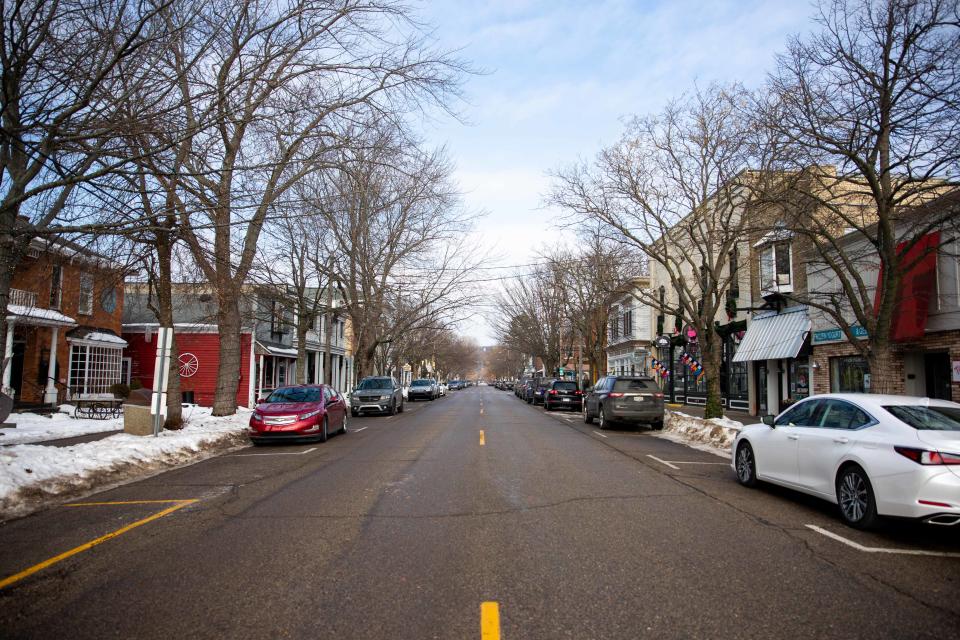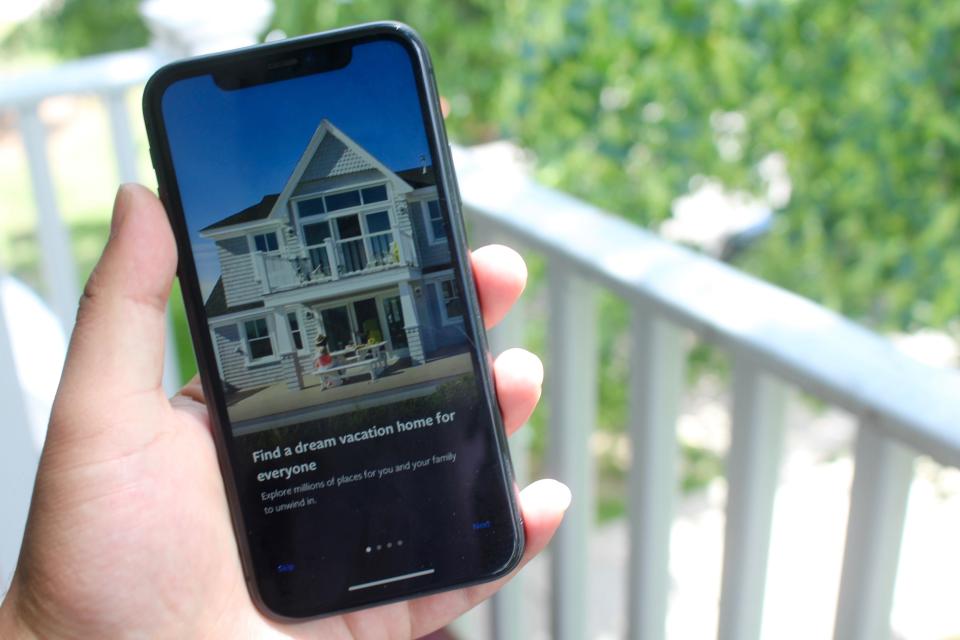Saugatuck becomes latest lakeshore community to grapple over short-term rentals
SAUGATUCK — Yet another lakeshore community is grappling with the reality of short-term rentals.
Two moratoriums were brought to Saugatuck City Council's workshop session Wednesday, March 22, including a moratorium on new short-term rentals and a temporary pause on waterfront commercial development and construction, both of which have been points of contention for residents.
More:Park Township votes to eliminate short-term rentals, doors must close by Oct. 2023
More:Michigan thrives on tourism. Are short-term rentals pushing out long-term residents?
The items were introduced for discussion after a recommendation by the Saugatuck Planning Commission on Thursday, March 16. The potential STR moratorium was first drafted in mid-February.
“Staff, working with legal counsel, has provided draft language for deliberation, which could potentially be used as a tool to pause new applications while the planning commission studies long-term strategies for managing STRs,” a letter to commissioners read.

The moratorium consideration comes after recent approval by the city to form an STR task force, composed of community stakeholders, with the purpose of developing recommendations for reforms to existing ordinances for consideration by the planning commission and city council.
The waterfront construction pause comes in the wake of an increase in demand to develop and expand structures and buildings along the waterfront — development that could pose environmental risks, given close proximity to the Kalamazoo River and Kalamazoo Lake.
Last week, the planning commission voted 5-1 in favor of both moratoriums. The public was given an opportunity to speak both during that meeting and the city council workshop, and many residents did.
“I am definitely in favor of this moratorium,” said resident Jane Underwood. “We have a problem here. I know some people see dollar signs for Saugatuck and Saugatuck has always been a town where money is important. Money is always important and I like it too, but it's gotten out of hand and I fear the town is going to be a dead town.
“We know we have a problem and we need to do something about it. Seriously, I think we can all agree on that. I think we need to figure out how big of a problem we really have. The only way we can do that is with a moratorium.”
But STR owners and their supporters felt the city hadn't been transparent. Councilman Gregory Muncey spoke to that issue during last week's public comment.
“The idea for a moratorium was never discussed at a council meeting or planning commission meeting before it was introduced as a draft just last week, March 9, a day after our city council workshop,” he said. “If, as a council member, I was never made aware of the desire or plan to introduce a moratorium, imagine the surprise to our community.
“We're starting (the) process of a task force, we don’t know the answers. I don’t know the answers and I’m not coming here saying it should be one way or the other, but I think we need to sit back and look at the data we're going to get from a third party. I think we're going to need to trust our task force to take in hand the responsibility we're giving them."
Saugatuck Director of Planning, Zoning and Management Ryan Cummins said the public was given multiple avenues for comment prior to approval of either moratorium.
“The planning commission meetings are public meetings, there are opportunities for public comment, that's the exact process that's laid out,” he said. “We put the information out in multiple formats and certainly people were reviewing the information and providing feedback to our planning commission via public letters and emails before the meeting.”
Council members were unable to reach a consensus on STRs, but agreed to implement the waterfront development moratorium during their regular meeting Monday, March 27. According to Cummins, the STR task force will also be voted on Monday, with its first meeting in April or May.
“In the meantime, we're working to identify a planning consultant or planning firm to help assist and facilitate the task force’s work to make sure they're able to look at everything holistically,” he said.
All task force meetings will be open to the public, with opportunities for public feedback.
Saugatuck isn't the first municipality along Lake Michigan to struggle with short-term rentals. In November, Holland's Park Township voted to ban STRs after a months-long process attempting to regulate them.
"We've heard all the arguments on both sides," said Park Township Clerk Skip Keeter. "We know the history forwards and backwards of Park Township, of our resort background — the fact remains (that) we've always called ourselves, since I've been here, a rural residential community, and as a rural residential community, we expect calm, quiet, nice neighborhoods.
"While I was wrestling with this and trying to decide on this motion, I wondered to myself what would happen if this issue was on a ballot and I think overwhelmingly the residents of Park Township would vote it down. I represent the residents of Park Township, I don't represent the owners ... I represent 18,700-plus people who want to have their rural residential neighborhoods."

Park Township, tucked along some of the most scenic pieces of Lake Macatawa and Lake Michigan, has a population of just under 19,000. For decades, short-term rentals have been disallowed in residential zones — but misinterpretations and "wink-wink" "nudge-nudge" assurances led to an abundance of STRs anyway, residents and rental owners claimed.
The problem was exacerbated by the red-hot real estate market in 2020 and 2021. As properties were snatched up for cash, residents complained about noise violations and other disturbances, and first-time homebuyers asserted the market was artificially inflated and nearly impossible to enter.
But while the door is closed in Park Township, and could be temporarily closed in Saugatuck, it might not be "entirely shut." The decision of either municipality could be undercut by legislation working its way through the Michigan Senate.
If passed and signed by Gov. Gretchen Whitmer, House Bill 4722 would amend the Zoning Enabling Act to prohibit municipalities from adopting or enforcing provisions affecting short-term rentals.
The bill passed narrowly in the House in 2021 and advanced to the Senate in late September 2022. It would make the rental of a dwelling a permitted residential use of property statewide. Municipalities could adopt certain ordinances and practices as long as they're applied to all rentals and residences, including regulation of noise, advertising and traffic.
Municipalities could also limit the number of short-term rentals owned by the same person or legal entity, as long as that limit isn't less than two, and municipalities could limit the total number of short-term rentals, as long as that limit isn't less than 30 percent.
The bill is supported by the Michigan Association of Realtors and the Rental Property Owners Association, but opposed by the Michigan Restaurant and Lodging Association — and, of course, dozens of municipalities statewide, in particular those struggling with affordable housing.
It's unclear where the bill stands after the November election. Short-term rentals, thus far, seem to be a largely bipartisan issue — with neither side taking public stances for or against the bill en masse.
Subscribe:Get all your breaking news and unlimited access to our local coverage
But in Saugatuck, residents and officials are just looking to maintain the vibrancy locals and tourists have come to love.
“Saugatuck is really a special community with amazing character and aesthetics and a great tourism economy that is robust and healthy,” Cummins said. “I think our planning commission and our policymakers on city council care deeply about this community and, as staff, we're here to support their work and make Saugatuck a better place.”
— Contact freelancer Austin Metz at ametz@gannett.com.
This article originally appeared on The Holland Sentinel: Saugatuck leaders grappling over details of short-term rentals
